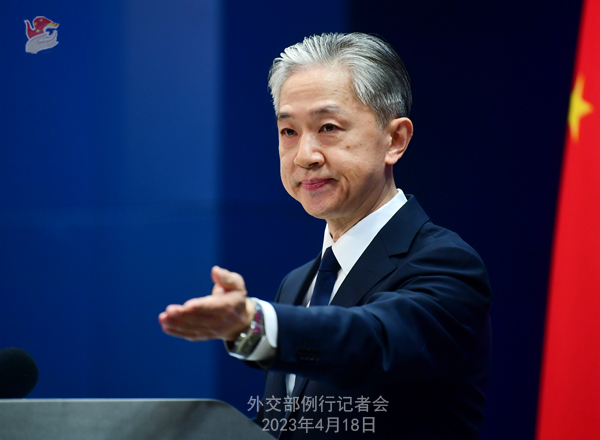G7 attempt to smear China condemned

Foreign Ministry spokesman Wang Wenbin speaks during a regular news briefing in Beijing, April 18, 2023. [Photo/fmprc.gov.cn]
Beijing warns group against creating division in international community
Beijing on Tuesday slammed a communique by the Group of Seven nations, saying it maliciously smeared China, grossly interfered in China's internal affairs and created antagonism and division in the international community.
The remarks came after foreign ministers in the G7 group criticized a number of Beijing's policies, including the country's actions in the East China Sea and South China Sea, the Taiwan question, issues concerning Hong Kong, Xinjiang and Tibet and its domestic investment environment.
On Tuesday, Foreign Ministry spokesman Wang Wenbin told reporters that China has made solemn representations to Japan, host of the G7 meeting, over the communique that shows arrogance, prejudice and intention of containing China.
Stance reiterated
Noting Taiwan is part of China's sacred territory, Wang reiterated that to truly maintain peace in the Taiwan Strait requires unequivocally opposing and stopping any "Taiwan independence" acts.
He stressed that the affairs of Hong Kong, Xinjiang and Tibet are China's internal affairs that brook no external interference under any pretext or in any way.
Wang also said the situation in the East China Sea and the South China Sea is stable, and relevant countries should stop sowing discord and creating confrontation among regional countries.
China is committed to providing a stable, fair, transparent and predictable investment and business environment for foreign investors, he added.
"Certain G7 members have been ignoring the principles of market economy and fair competition, abusing the concept of national security and using every means possible to suppress foreign companies," Wang said, adding they are in no position to criticize China.
In the end, Wang urged the bloc, which comprises the United States, Japan, Germany, Britain, France, Italy and Canada, to reflect on their own problems, abandon the Cold War mentality and ideological prejudice, and stop pointing fingers at other countries with a sense of superiority.
In fact, the language of the final statement by G7 foreign ministers has long been in focus since the beginning of the three-day meeting as rifts were seen among parties, with French President Emmanuel Macron this month saying the European Union should reduce its dependency on the US and cautioning against being drawn into the Taiwan crisis. Contrary to Macron, the host of the meeting, Japan, urged a unified tough stance on China as Tokyo insists "Ukraine might be East Asia tomorrow".
Liu Qingbin, former professor at the Institute of Advanced Sciences at Yokohama National University, said Japan's thinking is groundless and it should not push its ambition on strengthening the G7's "China-containment functions" nor will it succeed.
"Doing so will only lead to a self-fulfilling prophecy of conflict, distract the world from pressing global issues such as economic recovery and climate change, and harm their economic ties with China," Liu added.
According to Liu, the most dangerous scenario of all this is the self-fulfilling prophecy of conflict, because "if you treat someone as an enemy, he or she will almost certainly become one", which further results in a vicious cycle of escalation and conflict that would be "detrimental to all parties as well as the rest of the world".
Photos
Related Stories
- China urges G7 to cease interfering in other countries' internal affairs
- G7 foreign ministers vow to address global challenges through collective action
- G7 foreign ministers eye closer ties with developing countries
- G7 foreign ministers want to show unity, but the outside world sees rifts
- China urges G7 to unequivocally uphold one-China principle
Copyright © 2023 People's Daily Online. All Rights Reserved.









